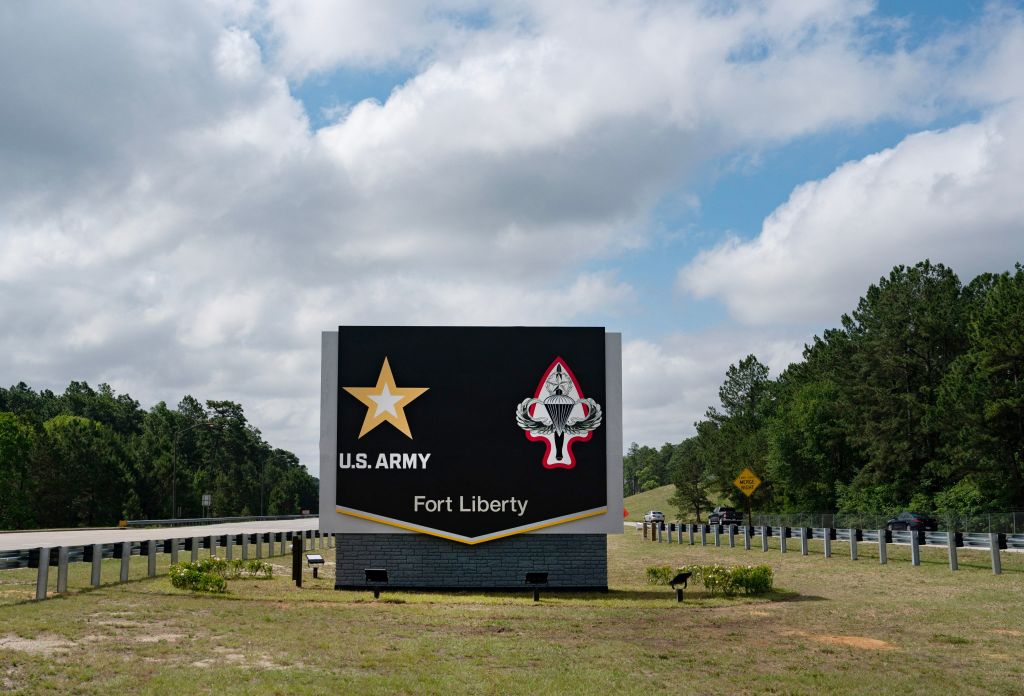Earlier this month Fort Bragg, the largest military post in the country, became Fort Liberty. While campaigning in North Carolina, where the base is located, Florida Gov. Ron DeSantis declared that as president he would restore the old name. During his own visit to the Tar Heel state, former Vice President Mike Pence also announced that he supported a reversal. Both candidates said their stance was based on opposition to “political correctness.”
Why were the names changed to begin with, and why is there backlash brewing now? Would the next president even have the power to reverse the change?
The process.
After the murder of George Floyd in 2020 and the racial unrest that followed, protesters around the country took to the streets to vandalize monuments and statues commemorating Confederate soldiers. When Sen. Elizabeth Warren introduced an amendment to the annual defense spending bill that would rename military assets that honored the Confederacy, she described the amendment as “one step toward addressing systemic racism.”
The proposed amendment became law in early 2021 when Congress passed the National Defense Authorization Act for Fiscal Year 2021. The bill included a provision requiring the secretary of defense to establish a commission renaming posts named after Confederate figures. (Its official title: the “Commission on the Naming of Items of the Department of Defense that Commemorate the Confederate States of America or Any Person Who Served Voluntarily with the Confederate States of America.”) Then-President Trump opposed the provision and rejected the bill, but Congress easily overrode his veto.
The bipartisan commission was tasked with developing criteria to identify Confederate-related Department of Defense assets, as well as standards and procedures for renaming them. The eight commissioners focused on recommending new names for nine Army bases, and issued a report advising Congress on how to manage other assets with Confederate names.
In their report recommending new names for the bases, the commission explained that in choosing the names of Southern bases established during World War I and II, the Army based most of its decisions on the preference of local leaders, who advocated for the Confederate generals they revered: “These names and memorials have far more to do with the culture under which they were named than they have with any historical acts actually committed by their namesakes.”
The commission similarly deferred to local sensitivities when choosing new individuals to commemorate. After receiving some 34,000 suggestions, the commission selected new names for different installations. With the exception of Fort Liberty, the names honor individuals who served the United States in times of conflict and “reflect the values and virtues” of the U.S. military.
Seven of the nine bases have already been renamed. Fort Bragg—the most well-known of the nine, named for notoriously unpopular and incompetent Confederate Gen. Braxton Bragg—officially became Fort Liberty on June 2. Others were renamed after prominent African-American soldiers. Georgia’s Fort Gordon will become Fort Eisenhower later this year.
Last year the commission estimated the cost to rename the Army posts at $21 million and the remaining Department of Defense assets at $41.5 million, for a total cost of $62.5 million. Yet Ty Seidule, vice chair of the commission and a history professor at Hamilton College, tells The Dispatch that the final costs won’t be known until the process is finished. Water towers are particularly expensive to deal with, according to Seidule.
The politics.
“I also look forward to, as president, restoring the name of Fort Bragg,” DeSantis said at the North Carolina Republican Party convention earlier this month. “It’s an iconic name and an iconic base, and we’re not going to let political correctness run amok in North Carolina.”
Local media reported “raucous cheers from the crowd” when DeSantis made the vow. But is it a popular position outside of the GOP base in a Southern state?
There hasn’t been much polling recently, though surveys from 2020 show the issue as divisive. Almost half of voters supported renaming military bases named for Confederates, according to a 2020 poll by Quinnipiac University. A small majority supported removing Confederate statues from public spaces around the country. A 2020 Military Times poll found that almost half of service members supported changing the names of military bases, and almost 70 percent believed that Confederate flags and symbols should be banned from public spaces on base.
The limits of presidential power.
Even if Pence or DeSantis were to become president, they would face an uphill battle in getting the old names reinstated. They lack the power to act unilaterally, and Congress isn’t eager to reverse course.
The NDAA for fiscal year 2020 bans the Department of Defense from naming new assets, or renaming existing ones, after Confederate figures. Given the strength of the majorities in both houses in overriding Trump’s veto of the 2021 NDAA—81-13 in the Senate and 322-87 in the House—it is unlikely that future Congresses would have the support needed to change the law.
“Congress created the Naming Commission to be bipartisan in nature for a reason,” a former Democratic congressional staffer tells the Dispatch. “Members across the aisle are invested in the permanence of those changes, and I don’t see future Congresses changing the law again so that we can rename military installations after folks who actively fought against the United States.”





Please note that we at The Dispatch hold ourselves, our work, and our commenters to a higher standard than other places on the internet. We welcome comments that foster genuine debate or discussion—including comments critical of us or our work—but responses that include ad hominem attacks on fellow Dispatch members or are intended to stoke fear and anger may be moderated.
With your membership, you only have the ability to comment on The Morning Dispatch articles. Consider upgrading to join the conversation everywhere.